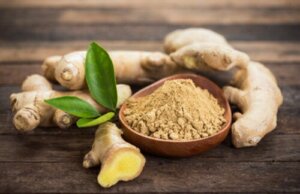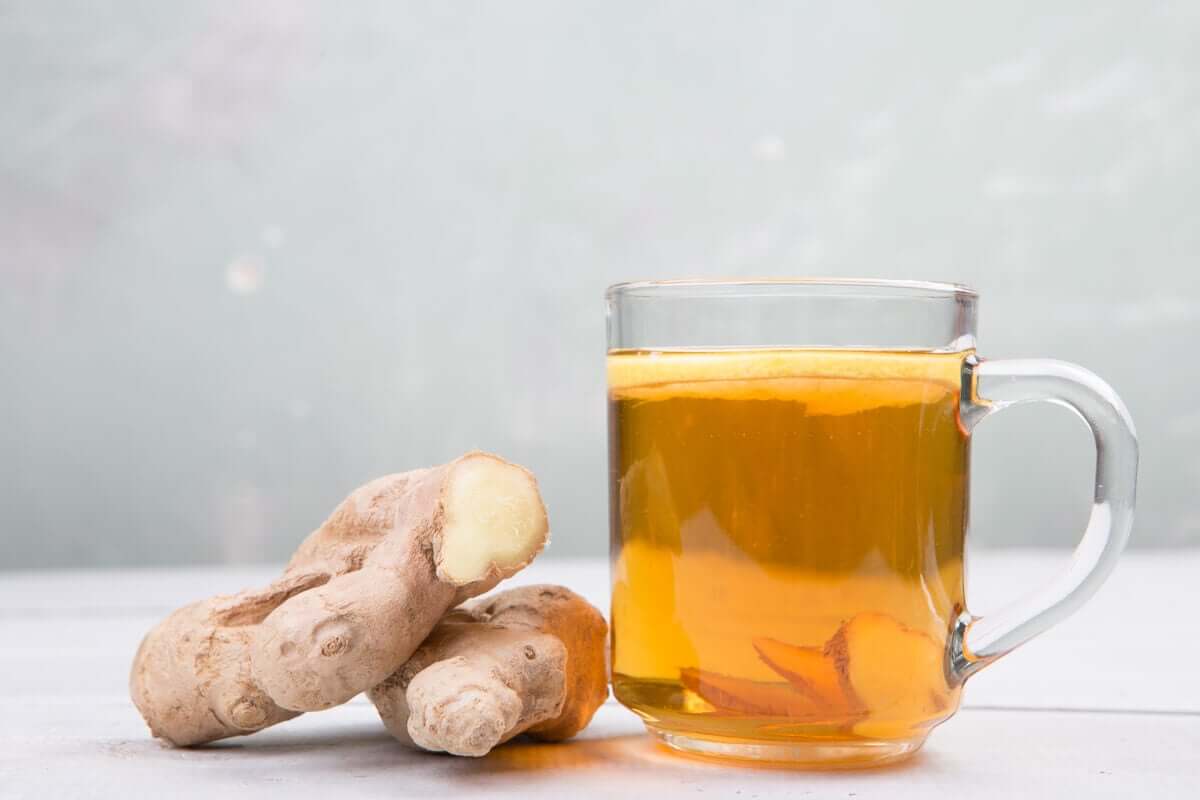Can You Eat Ginger During Pregnancy?

Ginger is one of the most beneficial culinary spices out there and it has many positive health effects. However, it must be taken into account that during pregnancy, you need to restrict the consumption of some of these elements to avoid complications. Therefore, today, we’re going to tell you whether or not you can eat ginger during pregnancy.
First of all, we must place special emphasis on the need to consume a varied and balanced diet at this stage of your life. At the same time, it’s essential that you guarantee hygiene from a microbiological point of view, as certain microorganisms could produce irreversible damage to the health of the fetus.
Is it possible to eat ginger during pregnancy?
To date, there’s no evidence to support that the consumption of ginger during pregnancy is harmful to the health of the mother or the baby. However, it’s important to avoid commercial supplements of this element and always use the root itself (whole or powdered). This food can be included in culinary preparations to improve the nutritional density of meals.
For some experts, it’s advisable to limit the consumption of ginger during the first and last weeks of pregnancy. This is because the root could increase the incidence of uterine contractions and thus increase the risk of miscarriage or premature delivery. However, the evidence on this effect is quite limited, and in any case, you only need to reduce the dose to adequate levels.

Ginger contraindications
It’s important to keep in mind that the consumption of ginger may have certain contraindications. For example, its intake isn’t recommended if you suffer from frequent stomach discomfort, as this spice could increase burning due to its spicy character.
Likewise, caution must be exercised when there are blood clotting problems. Whether you’re taking anticoagulant drugs or you have hemophilia, you need to restrict the presence of ginger in your diet. Otherwise, you could experience bleeding or other severe health consequences.
At the same time, it’s advisable to avoid eating ginger when there’s a diagnosis of hyperthyroidism. This food could stimulate the loss of lean mass and negatively condition your state of health. In these cases, it’s better to adapt your diet in a very particular way in order to keep your body composition in an optimal state.
Ginger benefits
Despite the previously mentioned contraindications, we also need to highlight the health benefits of ginger consumption. Among them, healthy weight control in cases of obesity in the context of a hypocaloric diet. However, these types of restrictive diets aren’t an appropriate option for pregnant women.
Also, ginger can be useful to reduce intestinal discomfort, colic, diarrhea, and pain associated with menstruation. This is because it works as a natural anti-inflammatory and pain reliever. It’s even safe and effective to prevent nausea and vomiting during pregnancy.
As if this weren’t enough, you should note that ginger can alleviate the symptoms associated with arthritis and other joint problems. Also, it produces a positive effect on blood glucose levels and on the lipid profile, for which its inclusion in the regular diet is recommended.
You can eat ginger during pregnancy

As you’ve seen, it’s safe to eat ginger during pregnancy without any major problems, although it’s best to use it at moderate doses during the first and last months of pregnancy. This way, possible uterine contractions that can trigger premature labor are avoided.
It’s essential to choose to include the root in your diet rather than commercial supplements, as the quality of the ginger is the determining factor of its results. In addition, when natural food is consumed, it’s less likely to reach an excessive or toxic dose.
Now, if you’re under pharmacological treatment, it’s best to consult with a specialist about whether it’s appropriate or not to continue during pregnancy. Many culinary spices can interact with certain medications and cause some problems for your health or that of your baby.
Ginger is one of the most beneficial culinary spices out there and it has many positive health effects. However, it must be taken into account that during pregnancy, you need to restrict the consumption of some of these elements to avoid complications. Therefore, today, we’re going to tell you whether or not you can eat ginger during pregnancy.
First of all, we must place special emphasis on the need to consume a varied and balanced diet at this stage of your life. At the same time, it’s essential that you guarantee hygiene from a microbiological point of view, as certain microorganisms could produce irreversible damage to the health of the fetus.
Is it possible to eat ginger during pregnancy?
To date, there’s no evidence to support that the consumption of ginger during pregnancy is harmful to the health of the mother or the baby. However, it’s important to avoid commercial supplements of this element and always use the root itself (whole or powdered). This food can be included in culinary preparations to improve the nutritional density of meals.
For some experts, it’s advisable to limit the consumption of ginger during the first and last weeks of pregnancy. This is because the root could increase the incidence of uterine contractions and thus increase the risk of miscarriage or premature delivery. However, the evidence on this effect is quite limited, and in any case, you only need to reduce the dose to adequate levels.

Ginger contraindications
It’s important to keep in mind that the consumption of ginger may have certain contraindications. For example, its intake isn’t recommended if you suffer from frequent stomach discomfort, as this spice could increase burning due to its spicy character.
Likewise, caution must be exercised when there are blood clotting problems. Whether you’re taking anticoagulant drugs or you have hemophilia, you need to restrict the presence of ginger in your diet. Otherwise, you could experience bleeding or other severe health consequences.
At the same time, it’s advisable to avoid eating ginger when there’s a diagnosis of hyperthyroidism. This food could stimulate the loss of lean mass and negatively condition your state of health. In these cases, it’s better to adapt your diet in a very particular way in order to keep your body composition in an optimal state.
Ginger benefits
Despite the previously mentioned contraindications, we also need to highlight the health benefits of ginger consumption. Among them, healthy weight control in cases of obesity in the context of a hypocaloric diet. However, these types of restrictive diets aren’t an appropriate option for pregnant women.
Also, ginger can be useful to reduce intestinal discomfort, colic, diarrhea, and pain associated with menstruation. This is because it works as a natural anti-inflammatory and pain reliever. It’s even safe and effective to prevent nausea and vomiting during pregnancy.
As if this weren’t enough, you should note that ginger can alleviate the symptoms associated with arthritis and other joint problems. Also, it produces a positive effect on blood glucose levels and on the lipid profile, for which its inclusion in the regular diet is recommended.
You can eat ginger during pregnancy

As you’ve seen, it’s safe to eat ginger during pregnancy without any major problems, although it’s best to use it at moderate doses during the first and last months of pregnancy. This way, possible uterine contractions that can trigger premature labor are avoided.
It’s essential to choose to include the root in your diet rather than commercial supplements, as the quality of the ginger is the determining factor of its results. In addition, when natural food is consumed, it’s less likely to reach an excessive or toxic dose.
Now, if you’re under pharmacological treatment, it’s best to consult with a specialist about whether it’s appropriate or not to continue during pregnancy. Many culinary spices can interact with certain medications and cause some problems for your health or that of your baby.
All cited sources were thoroughly reviewed by our team to ensure their quality, reliability, currency, and validity. The bibliography of this article was considered reliable and of academic or scientific accuracy.
- Maharlouei, N., Tabrizi, R., Lankarani, K. B., Rezaianzadeh, A., Akbari, M., Kolahdooz, F., Rahimi, M., Keneshlou, F., & Asemi, Z. (2019). The effects of ginger intake on weight loss and metabolic profiles among overweight and obese subjects: A systematic review and meta-analysis of randomized controlled trials. Critical reviews in food science and nutrition, 59(11), 1753–1766. Disponible en: https://doi.org/10.1080/10408398.2018.1427044
- Stanisiere, J., Mousset, P. Y., & Lafay, S. (2018). How Safe Is Ginger Rhizome for Decreasing Nausea and Vomiting in Women during Early Pregnancy? Foods (Basel, Switzerland), 7(4), 50. Disponible en: https://doi.org/10.3390/foods7040050
This text is provided for informational purposes only and does not replace consultation with a professional. If in doubt, consult your specialist.








